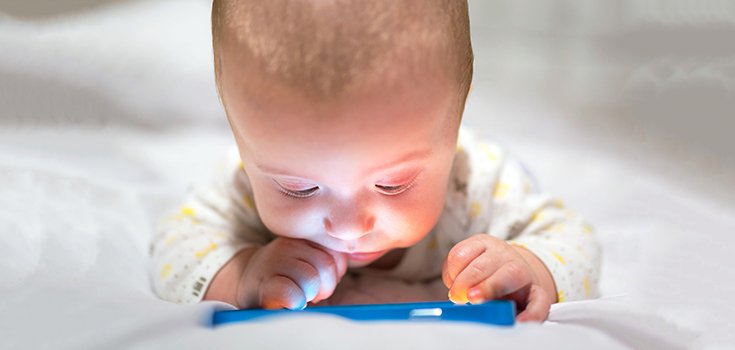Physicians Group Releases Screen Time Guidelines for Kids

How much time can a youngster spend looking at a smartphone, tablet, or computer before it becomes unhealthy? The American Academy of Pediatrics (AAP) released some screen time guidelines to answer that question. [1]

Electronic devices are often used to keep kids occupied, and there are many educational apps and programs available which could actually be quite helpful. However, like too much of anything, excess screen time can be detrimental. This is especially true particularly for children, who are still developing mentally, physically, and socially.
The AAP hosted a national conference in San Francisco in late 2016 where approximately 10,000 pediatricians gathered to discuss new children’s health recommendations for 2017. Cyber-bullying, screen time, and social media were at the forefront of the conversation. [2]
According to the AAP, it’s fine for children to Skype or Face Time with grandma and grandpa, as long as they have plenty of time to sleep, exercise, eat, converse, and, well, have fulfilling offline lives, too. [1]
Megan Moreno an associate professor of adolescent medicine at Seattle Children’s Hospital, and a guideline author, explains that spending time using electronic devices “is not evil, it does not need to be avoided. It just needs to be balanced with all the other things kids need.”
Why is it so Important to Limit Screen Time?
In May, a poll conducted by Common Sense Media, a non-profit group focusing on the effects of media and technology on children, found that 59% of parents with children ages 12-18 said their kids are addicted to their smartphones and can’t put them down.
What About Babies?
When it comes to children younger than 18-24 months old, the experts say that chatting with distant family members via Skype or Face Time can be a great way to communicate with people they wouldn’t normally see.
However, there is little evidence showing that children of that age can understand or benefit from using apps or engaging in other online activities.
So, when kids less than 1-1/2 to 2 years old watch TV or use electronic devices, parents should watch and play with them, according to the AAP.
Dr. Yolanda Reid Chassiakos, lead author of the “Children and Adolescents and Digital Media Technical Report” and assistant professor at UCLA, said:
“The TV should not be a babysitter. It’s much better to talk to a child or read from a book.” [2]
Ages 2-5
Parents should continue participating with their child in watching/playing, but should limit screen time to 1 hour. The AAP recommends “high-quality programming” for TV-watching, such as PBS Kids or Sesame Workshop. [1]
Older Children

Doctors with the AAP do not recommend a specific screen time limit for older children. However, they urge families to utilize its new online planning tool to develop their own daily media limits. In the plan, parents should include at least 1 hour of physical activity and adequate sleep (8-12 hours, depending on age), as well as unplugged family time.
AAP Sleep Guidelines for Children
In June, 2016, the AAP released guidelines for how much sleep children need. Here’s what they recommend:
- Infants 4 to 12 months – 12 to 16 hours of sleep every 24 hours (including naps).
- Children 1 to 2 years – 11 to 14 hours of sleep every 24 hours (including naps).
- Children 3 to 5 years – 10 to 13 hours of sleep every 24 hours (including naps).
- Children 6 to 12 years – 9 to 12 hours of sleep every 24 hours.
- Teens 13 to 18 years – 8 to 10 hours of sleep every 24 hours.
There were no guidelines created for children under 4 months, because infants’ normal sleeping habits vary.
Other Suggestions from the AAP
AAP doctors also recommend that parents:
- Ban screens an hour before bedtime and in bedrooms overnight. The light and noise can disrupt sleep. Specifically, electronic devices emit blue light, which prevents the pineal gland from releasing melatonin, a hormone that makes you feel tired and helps you sleep.

- Say no to entertainment media use during homework time so your kids can focus entirely on their work. This kind of multitasking has been shown to interfere with learning.
- Designate media-free places and times (such as dinner time) for all family members, including adults.
- Monitor what your kids watch and play, and talk to them about online bullying, sexting, and other dangers that lurk online.
Sources:
[1] USA Today
[2] CNN
